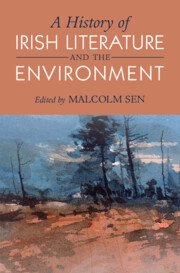Book contents
- A History of Irish Literature and the Environment
- A History of Irish Literature and the Environment
- Copyright page
- Contents
- Figures
- Tables
- Contributors
- Introduction Culture, Climate, Capital, and Contagion
- Chapter 1 Landscape and Literature in Medieval Ireland
- Chapter 2 The Irish Annals and Climate, Fifth–Seventeenth Centuries CE
- Chapter 3 The Environmental Vocabulary of Irish Folklore
- Chapter 4 Narratives of Arboreal Landscapes
- Chapter 5 Famine and Ecology, 1750–1900
- Chapter 6 Political Ecology in Nationalist Literature, 1880–1922
- Chapter 7 Solastalgic Modernism and the West in Irish Literature, 1900–1950
- Chapter 8 The Ecology of the Irish Big House, 1900–1950
- Chapter 9 Refuge and Domestic Space in Northern Irish Poetry, ca. 1940–Present
- Chapter 10 Irish Travellers, the Environment, and Literature
- Chapter 11 The Oceanic Imaginaries of Modern Irish Writing
- Chapter 12 Landscape in Irish-Language Literature: Poetry and Prose, 1900–2000
- Chapter 13 Poetry and Place
- Chapter 14 Animals and Climate Crisis in Irish Poetry
- Chapter 15 Animals and Animality in Irish Fiction
- Chapter 16 The Political Ecology of Food and Hunger, 1950–Present
- Chapter 17 Built Environments and Lived Ecologies in Contemporary Irish Poetry, 1998–Present
- Chapter 18 Transnationalism and Environment in Contemporary Irish Literature
- Chapter 19 Energy Futures in Contemporary Irish Fiction
- Bibliography
- Index
Chapter 8 - The Ecology of the Irish Big House, 1900–1950
Published online by Cambridge University Press: 14 July 2022
- A History of Irish Literature and the Environment
- A History of Irish Literature and the Environment
- Copyright page
- Contents
- Figures
- Tables
- Contributors
- Introduction Culture, Climate, Capital, and Contagion
- Chapter 1 Landscape and Literature in Medieval Ireland
- Chapter 2 The Irish Annals and Climate, Fifth–Seventeenth Centuries CE
- Chapter 3 The Environmental Vocabulary of Irish Folklore
- Chapter 4 Narratives of Arboreal Landscapes
- Chapter 5 Famine and Ecology, 1750–1900
- Chapter 6 Political Ecology in Nationalist Literature, 1880–1922
- Chapter 7 Solastalgic Modernism and the West in Irish Literature, 1900–1950
- Chapter 8 The Ecology of the Irish Big House, 1900–1950
- Chapter 9 Refuge and Domestic Space in Northern Irish Poetry, ca. 1940–Present
- Chapter 10 Irish Travellers, the Environment, and Literature
- Chapter 11 The Oceanic Imaginaries of Modern Irish Writing
- Chapter 12 Landscape in Irish-Language Literature: Poetry and Prose, 1900–2000
- Chapter 13 Poetry and Place
- Chapter 14 Animals and Climate Crisis in Irish Poetry
- Chapter 15 Animals and Animality in Irish Fiction
- Chapter 16 The Political Ecology of Food and Hunger, 1950–Present
- Chapter 17 Built Environments and Lived Ecologies in Contemporary Irish Poetry, 1998–Present
- Chapter 18 Transnationalism and Environment in Contemporary Irish Literature
- Chapter 19 Energy Futures in Contemporary Irish Fiction
- Bibliography
- Index
Summary
Built infrastructure, housing, land management etc., are historically conjoined to the legacy of Anglo-Irish big houses. These prominent questions also need to be viewed in relation to ecological imperialism. By 1870, as Kelly Sullivan reminds us in this chapter, there were at least 4,000 big-house estates all over Ireland. In later decades many of these estates fell into disrepair or were razed to the ground by financially strapped owners. In addition, the “violent destruction of close to three hundred big houses during the War of Independence and Civil War (1919–23)” and the repurposing of the remaining houses as “schools, prisons, hospitals, and other institutions [such as] hotels, museums, and tourist sites, or as small privately owned farms,” point to their centrality in Irish geographical, political, and cultural landscapes. However, Kelly argues that although “Big House novels … have undergone a reassessment, with scholars no longer reading them as elegies for an extinct way of life, they are yet to be viewed from an environmental perspective.”
- Type
- Chapter
- Information
- A History of Irish Literature and the Environment , pp. 173 - 189Publisher: Cambridge University PressPrint publication year: 2022

